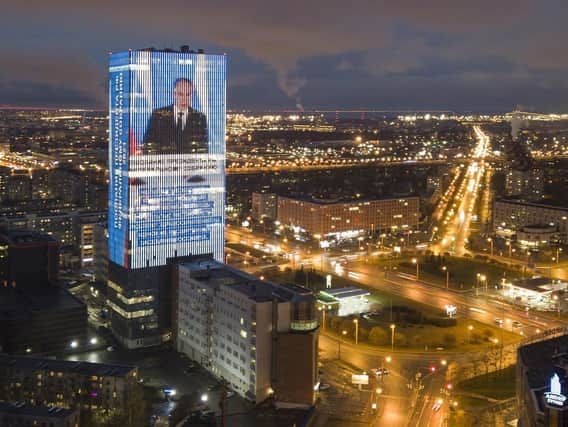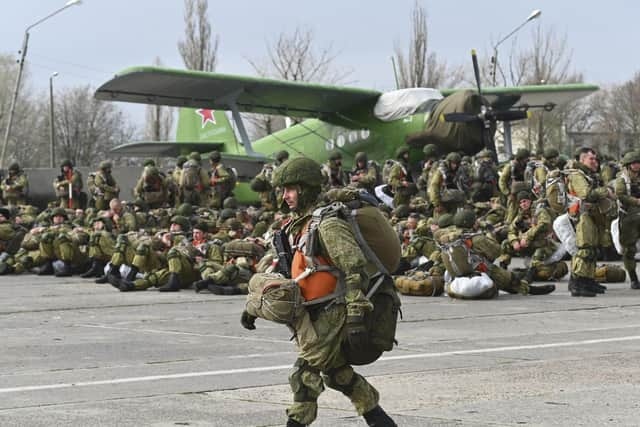Honesty at a premium in West's propaganda war with Putin's Russia over Ukraine


I’m saying this because the West’s currently fighting a largely propaganda war with Russia over Ukraine where both sides seem to have scant regard for honesty.
My worry is, though, that unless we try to understand Russia better, there’s a real danger of much bloodier clashes.
Advertisement
Hide AdAdvertisement
Hide AdI’ve visited Russia often and when I was last there I saw something which acted like a window on the nation’s soul.


In the middle of a leafy park a Muscovite family clustered round a toddler who was trying to catch a balloon that they were knocking one to another. The child squealed with pleasure as the adults beamed.
My guide noticed my interest and said, “Children are so precious to us: we’re still trying to rebuild our population after what the Nazis did.”
The Russians, like us, are fixated by the Second World War. Yet, whilst Stalin’s horrors are ignored, the slaughter of about 30 million followed by the Cold War and then the collapse of communism left Russia broke, insecure, suspicious and aggressively defensive: that paranoia has led directly to today’s crisis with Ukraine.
Advertisement
Hide AdAdvertisement
Hide AdNow, indulge me for a moment as I try to put Russia’s case.
Once the Soviet empire collapsed in the 1990s, the Ukraine – which hung like a punch bag between Russia and her Cold War opponents in Europe – began leaning more towards the prosperous west.
Kiev responded to overtures from the EU whilst the large minority of Russian nationals in eastern Ukraine and the Crimea became increasingly uneasy, and looked towards Moscow for protection.
In response, Russia threw its weight around especially heavily once membership of NATO was broached.
Advertisement
Hide AdAdvertisement
Hide AdThen, in the bloody chaos on Kiev’s Maidan in 2014, Russia saw a friendly, democratically chosen President Yanukovich toppled in a coup backed by Merkel’s Germany and Obama’s USA and replaced by an unelected puppet.
Suddenly, the friendly buffer of Ukraine was turning bad: Russian people there sought protection as a proxy war crackled in Donbass in the east and the Crimea was annexed.
I was in that peninsula at the time and saw and heard things which appalled me.
First, it’s important to understand that whilst Crimea was part of Ukraine it was full of Russian nationals and a powerful, nuclear tipped fleet.
Advertisement
Hide AdAdvertisement
Hide AdSo, when Mr Putin activated his forces there, the Ukrainian fleet in the same harbour quietly defected – as did the vast majority of police and officials.
Yet, some of the western journalists who suddenly materialised, reported an invasion and bitter combat: truth died quickly.
Meanwhile, the now infamous Ursula von der Leyen (Germany’s defence minister at that point) fanned the flames.
She suggested that German troops should oversee attempts at a ceasefire in Donbass whilst one Ukrainian MP spoke for many saying, “No matter how the situation is resolved in Crimea, we need a much stronger Ukraine. If you have nukes, people don’t invade you.”
Advertisement
Hide AdAdvertisement
Hide AdYet, whatever the real relationship between Moscow and Mr Trump, his time in office saw a plateau in tension.
The fighting rumbled on, crises came and went but never overspilled – until now.
The catalyst, of course, was the change of regime in Washington and a chance to redraw the boundaries by all the parties concerned.
Kiev’s now clamouring to be allowed to join NATO, but are being resisted.
Advertisement
Hide AdAdvertisement
Hide AdAdmitting Ukraine would be deeply provocative to Moscow as any aggression towards a member state guarantees that all the others will react.
Mr Putin is only too aware of this: he must be grinning with delight at the bind NATO’s created for itself.
In the face of Russia moving troops, armour and aircraft to Crimea and the eastern border, last week Ukraine pulled the bear’s tail by threatening to build nuclear weapons again.
Simultaneously, Mr Biden failed a big test. He turned around two destroyers which were bound for the Black Sea having been told by Mr Putin that they should “stay away for their own good”.
Advertisement
Hide AdAdvertisement
Hide AdThis is exactly what Russia wanted: Ukraine and NATO at each other’s throats and the new President humiliated.
And if you believe that there’s no point in moving 90,000 odd troops to flash points unless you intend to use them, you’re wrong.
Effective modern warfare’s about stealth and blitzkrieg – it’s not about leaving your hardware in the open where it can be counted by drones and satellites.
And, if you’re a wily strategist like Mr Putin, you ratchet up the pressure, bring the confrontation to boiling point and then send the whole shooting match back to barracks just like he did last Thursday.
Advertisement
Hide AdAdvertisement
Hide AdIn one, masterly stroke Mr Putin’s exposed his opponents’ weaknesses and demonstrated his complete grasp of realpolitik. He’s threatened, manipulated democracies, bent the truth and shown that he’s a dangerous, neurotic bully: but perhaps that’s because the past has taught Russia some brutal lessons in survival.
Patrick Mercer is a former Conservative MP for Newark and Army colonel.
Support The Yorkshire Post and become a subscriber today. Your subscription will help us to continue to bring quality news to the people of Yorkshire. In return, you'll see fewer ads on site, get free access to our app and receive exclusive members-only offers. Click here to subscribe.